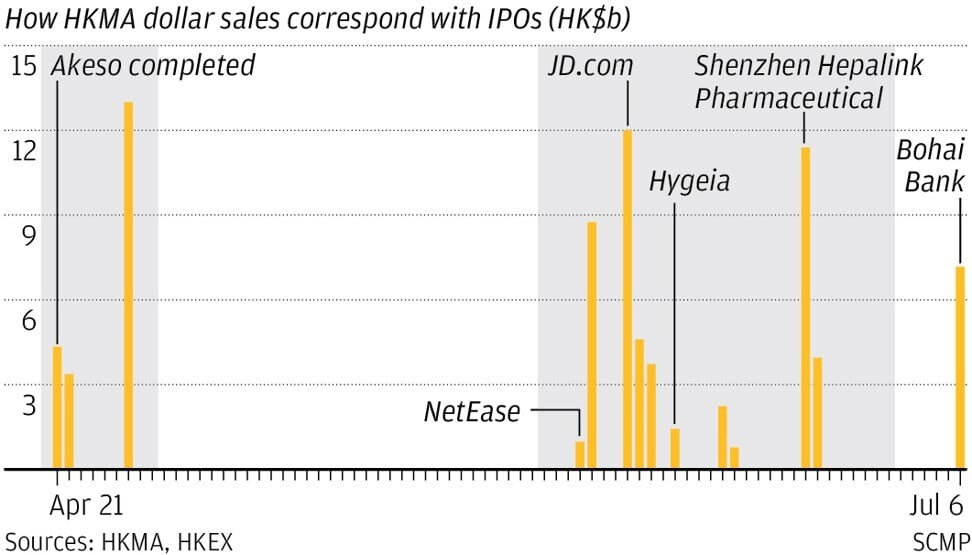HKMA forced to intervene to weaken currency 15 times in September as hot money chases hot Chinese IPOs, secondary listings in the city.
The amount of money deposited in Hong Kong’s banking system surged for a third straight month in August as investors chased a series of hotly anticipated initial public offerings (IPO) and secondary listings by Chinese firms in the city.
Deposits held in accounts rose by HK$387.9 billion (US$50 billion), or 2.7 per cent, to reach HK$14.8 trillion at the end of August, the Hong Kong Monetary Authority (HKMA) said on Wednesday. Deposits were up 8.9 per cent from a year earlier.
It followed a 2.7 per cent increase in deposits in July and a 1.6 per cent jump in June, which at the time was the largest monthly increase in two years.
Excluding IPO loans and the resulting creation of deposits, total deposits would have increased by 0.9 per cent, the HKMA said in a statement.
Tens of billions of dollars of hot money – short-term investment cash chasing quick returns – flowed into the city since April as investors sought to invest in secondary listings by the likes of JD.com, NetEase and Yum China, the operator of KFC and Pizza Hut in the mainland, as well as Nongfu Spring‘s red hot IPO.
Ant Group, the operator of Alipay and an affiliate of Alibaba Group Holding, filed for a dual IPO in Hong Kong and Shanghai near the end of August, attracting even more capital to the city for what could be the world’s biggest fundraising on record. Alibaba is the owner of the South China Morning Post.
Ant Group received approval on September 18 from the stock listing committee of the Star Market, Shanghai‘s Nasdaq-style stock market and is awaiting approval from Hong Kong authorities.
Hong Kong dollar peg-o-meter
The Hong Kong Dollar has been pegged to a narrow trading band between HK$7.75 and HK$7.85 per US dollar. When the Hong Kong currency hits the low end of the band, the city’s de-facto central bank, the Hong Kong Monetary Authority, is bound to start buying up the currency to boost its value.
A number of Chinese firms that originally went public in the United States sought secondary listings closer to home in Hong Kong or engaged in “take-private” transactions as relations between Washington and Beijing worsened this year. More such deals are anticipated in the coming months, according to reports.
A group of top US regulators recommended in August that Chinese companies and other foreign issuers who fail to provide access to their audit working papers for oversight be delisted from American bourses by January 2022. The US State Department also asked American colleges and universities to divest their holdings in Chinese companies, warning of the potential for “wholesale delisting”.
With so much capital flowing into the city, the HKMA intervened multiple times in the currency markets this year to try to weaken the Hong Kong dollar.

The HKMA stepped into the markets 15 times this month, including twice on Wednesday, to sell HK$69.4 billion worth of its currency and to buy the same amount of the US dollars, pushing the exchange rate to HK$7.75 per US dollar. It is the highest amount of Hong Kong dollars it sold this year, surpassing HK$53.3 billion in July.
Even after 15 interventions this month, the Hong Kong dollar was trading at HK$7.7502 per dollar on Wednesday afternoon, which is just below the top end of a trading band with the US dollar.
Under Hong Kong’s currency peg system, the local dollar is pegged to the US currency at HK$7.80, and the HKMA will intervene to make sure it trades within the HK$7.75 and HK$7.85 band.
HKMA has intervened 53 times this year for a total of HK$189.6 billion.















